New ESI Macedonia Report – Waiting for Godot and enlargement – Stone bridge dialogue
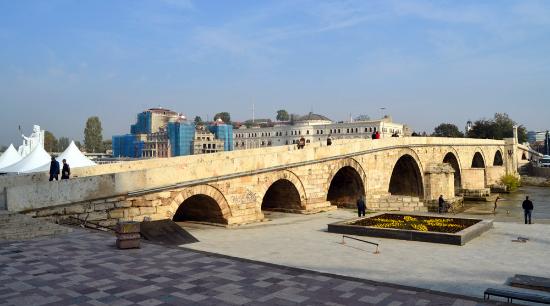 |
|
|
Old stone bridge – Skopje |
|
Dear friends of ESI,
|
Subject: |
the deepening crisis of EU enlargement policy |
|
Setting: |
the centre of Skopje, Macedonia, candidate for EU |
|
Protagonists: |
Vladimir-the-EU-is-not-fair |
|
What is at stake: |
The future of a crucial and unstable region |
|
What is needed: |
A pre-accession process that is stricter, fairer and |
All this in the new ESI Report:
Vladimir and Estragon in Skopje – A fictional conversation on trust and standards and a plea on how to break a vicious circle (17 July 2014)
More here: www.vladimirandestragon.org
A collapse of trust
Today trust in enlargement policy is declining everywhere: in EU member states, in candidate countries, among those who govern and those in opposition. In the past five years opposition to enlargement has deepened in every single EU member state, old and new, rich and poor, those hit hard by the global economic crisis and those relatively unscathed.
A recent survey (autumn 2013) shows that an absolute majority of EU citizens oppose further enlargement (52 per cent). Opposition is even stronger among euro area respondents (60 per cent). The fall in support for enlargement is sharpest in traditionally pro-enlargement countries such as Italy (where opposition to enlargement increased by 22 percentage points) or Spain (21). The recent changes in Cyprus, the Czech Republic and Slovakia are also dramatic.
Many people in EU member states question the central premises of the pre-accession process: that it is a powerful tool for transformation, capable of accelerating reforms in candidate countries so they become fit for accession in the foreseeable future. And can enlargement really be a win-win policy that makes the EU stronger without such a transformation?
Vetoes and delays
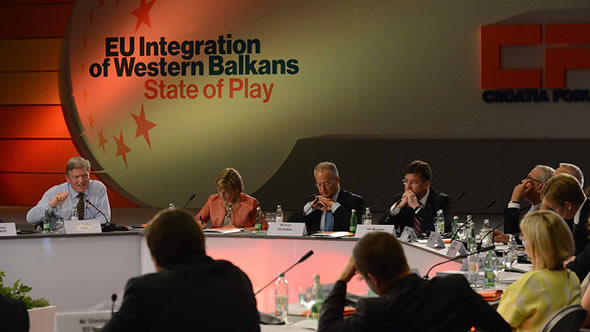 |
|
A combination of bilateral vetoes and hesitations has already brought the formal accession process to a snail's pace.
Turkey has been negotiating since 2005 and has not yet opened even half its negotiation chapters. A bilateral veto blocks opening even the chapter on human rights.
Macedonia is a candidate since 2005. It has not yet been given a date even to open negotiations. It is blocked since 2009 by a Greek veto and the unresolved name dispute.
Bosnia and Herzegovina concluded its negotiations on the Stabilisation and Association Agreement in 2008. Yet it is still not in force. The EU decided to make implementation of the Sejdic-Finci ECtHR judgement a precondition for any further steps.
Albania became a candidate this year, but has been warned already that it could be years away from opening accession talks.
To an increasing number of people in accession countries the current process appears to be a stairway to nowhere. So they worry when the incoming president of the European Commission, Jean Claude Juncker, tells the European Parliament this week:
"… the Union and our citizens now need to digest the addition of 13 Member States in the past ten years. The EU needs to take a break from enlargement so that we can consolidate what has been achieved among the 28."
Macedonia and the writing on the wall: mene, tekel …
In summer 2013 the Dutch Foreign Ministry invited ESI to look at the future of EU-Macedonia relations. We made almost one hundred interviews with Macedonian's from all walks of life. What we found was deeply worrying.
Compared to only a few years ago, the EU has lost the trust and confidence of almost every group in Macedonian society, from the most ardent supporters of the current government to its harshest critics. We also found nobody who believes that the name dispute with Greece will be resolved any time soon.
Since 2001 the aspiration of joining the EU has played a crucial role in stabilising a country with deep internal divisions. As the belief in the credibility of this vision fades old concerns and fears return.
Vladimir and Estragon in Skopje
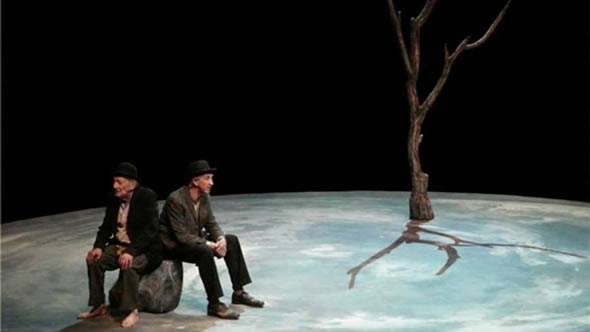 |
Anybody who has visited Macedonia has met people like them: Vladimir and Estragon, two sophisticated and disappointed Macedonians. They also have cousins in other Balkan countries and in Turkey.
According to VLADIMIR all talk of a merit-based accession process is humbug. His evidence is the Greek veto blocking accession talks and unfair criticism of Macedonian democracy:
VLADIMIR: When it comes to Macedonia, there have never been established criteria. Nothing has ever been about merit. For five years now the European Commission has recommended the opening of accession talks. Last time it did so the member states did not even put a discussion about Macedonia on their agenda.
They consider us "nationalists" because we want to be called what we are: Macedonians. Because we put up a few statues in the centre of our capital. They say our actions and statues are provoking the Greeks. As if Antonis Samaras, the Greek prime minister and father of this whole conflict, needs any provocation. When he was foreign minister in 1992 he wrote a letter to the EU and complained that we added "the Greek apostles Cyril and Methodius" to the "Skopjan pantheon"! Do Cyril and Methodius not belong to us as much as to Greece or Bulgaria? They are the patron saints of Slovakia, for heaven's sake! Did Greece block Slovakia?
According to ESTRAGON, the problem is different: the Macedonian government was never serious about the EU and the EU is not strict enough.
ESTRAGON: We need the EU more than the EU needs us. We cannot be any less focused, any less smart about overcoming the obstacles, than previous small and poor countries that managed to join. Estonia. Latvia. Croatia. Even Bulgaria after 1997. And the whole record of VMRO suggests that in fact it is not prepared to do what it takes, even if there were no Greek veto offering an easy excuse.
Vladimir and Estragon disagree about most burning issues:
Human rights and minorities
VLADIMIR: We have primary schools in Macedonia in five different languages. In the EU member states Bulgaria and Greece ethnic Macedonians are denied their language. We have a Turkish party in parliament. Turks born in Greece are citizens of the EU, but are not even allowed to call themselves "Turks". Our Roma are certainly better off and less discriminated than Roma in Hungary or in Bulgaria or in most EU members. In no other small country in Europe is there as much ethnic, religious, linguistic diversity. Our capital is officially bilingual, Albanian and Macedonian. And yet, we are "nationalists" and do not meet the Copenhagen criteria?
ESTRAGON: Did you see the pictures of Macedonian heads, cut off by Greeks rebels, presented to the Greek orthodox priest in the big painting in our great new Museum on the Macedonian Struggle. In that museum, I saw school children with tears in their eyes, moved by the story of our struggle against our many enemies. Cruelties by Ottomans, Greeks, communists. The most common exhibit in this museum is guns: they are everywhere. Is this our history, our identity, our future? Is this the official vision how to bring up the next generation?
The media situation
VLADIMIR: Recently the Council of Europe's Commissioner for Human Rights, Nils Muiznieks, published a commentary on press freedom in Europe. Muiznieks sees problems in many places. He mentions Turkey. Ukraine. Bosnia. Spain. Italy. Serbia. Azerbaijan. And yes, in passing he mentions Macedonia. It is one of many countries with problems.
ESTRAGON: You refer to European double standards a lot. Let us be real. Every single organization, non-governmental or international, that has looked at media freedom in Macedonia, for many years now, has come to the same conclusion: that the current situation is terrible. The UN envoy Frank La Rue. The OSCE envoy Dunja Mijatovic. Reporters without Borders. Freedom House. IREX. The European Federation of Journalists. The Committee to Protect Journalists. Most EU ambassadors. The OSCE's Office of Democratic Institutions and Human Rights from Warsaw.
The state of the economy
VLADIMIR: We are doing well considering that we have to cope with a global economic crisis without the financial support from the EU that Greece and Bulgaria receive every year. Bulgaria has its highways paid for by the EU. We need to get our credit from China. Greek farmers receive subsidies from the EU. We have to help them ourselves. Do not tell me that Bulgaria or Greece are the places to look to for lessons in economic management.
ESTRAGON: Macedonia is falling ever further behind! GDP per capita, investment per capita, our employment rate … in all categories. Our country is one of the poorest in Europe. Very few of us have work. And because so few people work, our average monthly income per capita is only €120. Our employment rate stands at 44 per cent. The average rate for the EU is 64 per cent – a dramatic 20 percent-point difference!
Whether Macedonia needs the EU
VLADIMIR: I refuse to be defeated. This I like about our prime minister: if the French do not like us, or the Greeks, or the Bulgarians … well, then we go to India or China to find investors. If we are realists, we should accept that nothing good has come from Brussels in years. We must not be naïve and see the EU as a magic wand. We do not need it to survive.
ESTRAGON: You suggest we have time and the status quo is acceptable. But you play with fire. We had an ethnic conflict in 2001. We have a history of tension. Ours is a traumatized society. There is fear of pensions or state salaries not being paid, of further decline. I understand why our people put stability above everything else, but unfortunately, there is no stability where we are going.
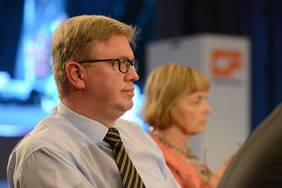 |
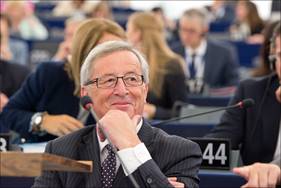 |
|
Can the European Commission square the circle? |
|
Pozzo and how to square the circle
In the end Pozzo joins the conversation. He tells Vladimir and Estragon that they risk sounding like the old men on the balcony in the Muppet Show. The real question they do not answer is why the EU should admit any new members that promise more trouble than benefits:
POZZO: So ask yourself the most obvious question of all. Would you, if you were a leader in Germany, the Netherlands or the Czech Republic, be in favour of letting seven poor South East European countries with a combined population of 100 million – I include Turkey here – join an EU which is already struggling? Or even just six poor small Balkan countries, where Montenegro, Bosnia, Serbia, Macedonia will each have a seat at the table and a veto on many issues?
Enlargement cannot survive unless it is seen to be both strict and fair, demanding and inspiring, in both the EU and in accession countries. Pozzo notes that this has recently been achieved, with the European Commission in the lead, in the field of visa liberalisation roadmaps. He makes a range of suggestions. His final one is for the next European Commission:
POZZO: Listening to the two of you, and recalling what I heard in critical EU member states, I see interesting common ground. You all say that you want the pre-accession process to be more objective. Indeed: nothing is as demotivating as the sense that assessments are arbitrary, whether in school or in your professional life. Also: nothing creates as much suspicion in EU member states as the sense that the process is incomprehensible, that we – the Commission – are hiding things. Today few people understand the many reports, the lists of conditions, different for every country, the many standards, vetoes and fora – HLADs, positive agendas, enhanced dialogues and association councils. We need to make this all understandable again. Clear. Transparent.
On the circuit
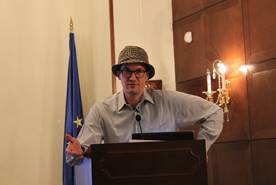 |
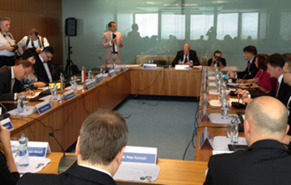 |
|
Gerald as Vladimir at CRPM event in Skopje – Kristof at V4 ministers' meeting in Bratislava |
|
In recent weeks ESI has presented these ideas and early versions of this report to decision makers across Europe:
At the invitation of the Dutch ambassador to Macedonia to EU ambassadors in Skopje
At an event of Macedonia's leading think tank CRPM in Skopje
To young leaders from the Western Balkans in Brussels
At the invitation of the Albanian foreign minister at the annual ambassadors' conference in Tirana
At the invitation of the Croatian foreign minister at the annual Croatia Summit in Dubrovnik
At the invitation of the deputy prime minister of Slovakia at the meeting of Visegrad-4 foreign ministers in Bratislava.
A video clip with the presentation of the Vladimir and Estragon report you find here.
A video clip presenting the ESI proposals for the future of enlargement policy can be accessed here.
The ESI research project in Macedonia is supported by the Foreign Ministry of the Netherlands.
ESI's research on the future of enlargement is supported by ERSTE Stiftung in Vienna and the Foreign Ministry of Sweden. We thank all of them!
Many best regards,

Gerald Knaus
- Everything about Godot in the Balkans: www.vladimirandestragon.org
- New Macedonia report: Vladimir and Estragon in Skopje
- Sources for report
- ESI proposal on future of progress reports
- News – ESI in Bratislava, Dubrovnik, Tirana, Brussels, Skopje
